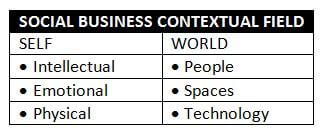(Editorial Note: This is post 1 of 2)
Now more than ever, talent development is a life-long process, transcending education, career, technology and social media. It cuts to the core of why we’re here and what it means to be human.
We are here to become more — to maximize the development of our talent by improving performance in every aspect of living. And, we are here to guide and support others in doing the same.
Consider the countless number of hard and soft skills it takes to navigate a single day of living in the 21st century. We’re swimming in a contextual field of opportunities, challenges, goals and choices!
Social Business: What’s New?
Business has always been a social endeavor. Despite relentless change — including the recent arrival of revolutionary social media tools — many of the essential skills for business success have remained the same throughout history. No mystery there. Business is and will always be about creating and sustaining mutually beneficial relationships.
So what’s changing at a revolutionary level? According to “Social Era” author, Nilofer Merchant, the most successful businesses are adapting and integrating traditional relationship-building skills and processes into the digital landscape.
Professional Life and the New Social Norm
Of course, the implications of social business don’t stop at an organizational level. Work and personal life are merging, as workloads increase, and mobile technology and social platforms grow more prevalent. The traditional boundaries and walls that separated life roles are being erased. Social and mobile channels are morphing work-life balance into a work-life blend.
Our diverse roles are becoming synthesized into a single life style. We work, we play, and we live — engaging anywhere, anytime, with anyone we choose. Many people now live in a blurry space between “real” life and digital life, professional and personal, internal and external.
Filtering the Social Clutter
IBM estimates that 90% of the data in the world today has been created in the last two years alone. What does that mean for social learning? We have too much information, not enough transformation. Despite extensive learning, education, training and development, people think, feel and react in the same ways over and over. Think about the volume of content you absorb on a daily basis. What percentage of that information actually helps you create a positive impact in your life, or the lives of others?
Here’s a tool to help cut through the fog and chaos of today’s deafening social noise. I call it the “social business contextual field.” This filter helps brings clarity and precision to individual and organizational goals, strategies, learning, development, communication and transformation. It is based on six core components.

These six concepts represent all the complex relationships within social business. We can draw endless connections between words. For example, we think about how we feel. How we feel impacts how we think. Our thoughts and emotions largely determine our reactions and choices. We think about people, spaces and technology. We’re emotionally connected to people, spaces and technology. We physically engage with people spaces and technology.
Social business success hinges on learning how to develop and continuously improve connections, communication and collaboration among all aspects of the contextual field. Specifically, when individuals and organizations align, integrate and transform both sides of the contextual field, success follows.
In our work, we mash the two words “engagement” and “performance” into a single word, “engagement-performance.”
Engagement-performance transformation is above and behind all skill development. Consciously or unconsciously, we are engaging and performing every moment. Social talent development centers on transforming our capacity to engage-perform-produce more, better, faster, now — no matter what’s happening in or around us.
A culture of social learning, backed by engagement-performance transformation, does not happen by accident or good intentions. We must do three things to create and sustain engagement-performance transformation: